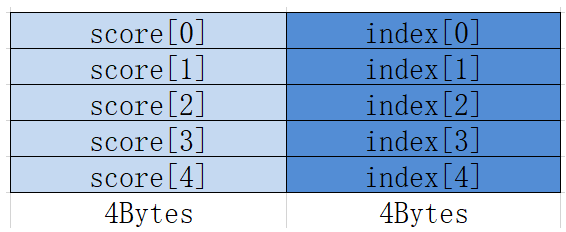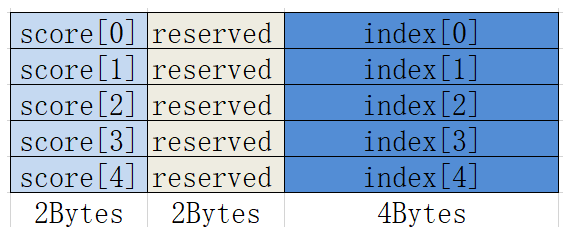MrgSort
函数功能
将已经排好序的最多4条队列,合并排列成1条队列,结果按照score域由大到小排序。
- Atlas A2训练系列产品/Atlas 800I A2推理产品:MrgSort处理的数据一般是经过Sort处理后的数据,也就是Sort接口的输出,队列的结构如下所示:
- Atlas 推理系列产品:输入输出数据均为Region Proposal,具体请参见ProposalConcat中的Region Proposal说明。
函数原型
1 2 |
template <typename T, bool isExhaustedSuspension = false> __aicore__ inline void MrgSort(const LocalTensor<T> &dstLocal, const MrgSortSrcList<T> &sortList, const uint16_t elementCountList[4], uint32_t sortedNum[4], uint16_t validBit, const int32_t repeatTimes) |
参数说明
接口 |
功能 |
|---|---|
T |
操作数的数据类型。 |
isExhaustedSuspension |
某条队列耗尽(即该队列已经全部排序到目的操作数)后,是否需要停止合并。类型为bool,参数取值如下:
默认值为false。 |
参数名称 |
输入/输出 |
含义 |
|---|---|---|
dstLocal |
输出 |
目的操作数,存储经过排序后的数据。 类型为LocalTensor,支持的TPosition为VECIN/VECCALC/VECOUT。 Atlas A2训练系列产品/Atlas 800I A2推理产品,支持的数据类型为:half/float Atlas推理系列产品AI Core,支持的数据类型为:half/float |
sortList |
输入 |
源操作数,支持2-4个队列,并且每个队列都已经排好序,类型为MrgSortSrcList结构体,具体请参考表3。MrgSortSrcList中传入要合并的队列。 template <typename T>
struct MrgSortSrcList {
LocalTensor<T> src1;
LocalTensor<T> src2;
LocalTensor<T> src3; // 当要合并的队列个数小于3,可以为空tensor
LocalTensor<T> src4; // 当要合并的队列个数小于4,可以为空tensor
}; Atlas A2训练系列产品/Atlas 800I A2推理产品,支持的数据类型为:half/float Atlas推理系列产品AI Core,支持的数据类型为:half/float |
elementCountList |
输入 |
四个源队列的长度(8Bytes结构的数目),类型为长度为4的uint16_t数据类型的数组,理论上每个元素取值范围[0, 4095],但不能超出UB的存储空间。 |
sortedNum |
输出 |
耗尽模式下(即isExhaustedSuspension为true时),停止合并时每个队列已排序的元素个数。 |
validBit |
输入 |
有效队列个数,取值如下:
|
repeatTimes |
输入 |
迭代次数,每一次源操作数和目的操作数跳过四个队列总长度。取值范围:repeatTimes∈[1,255]。
repeatTimes参数生效是有条件的,需要同时满足以下四个条件:
|
参数名称 |
输入/输出 |
含义 |
|---|---|---|
src1 |
输入 |
源操作数,第一个已经排好序的队列。 类型为LocalTensor,支持的TPosition为VECIN/VECCALC/VECOUT。 数据类型与目的操作数保持一致。 Atlas A2训练系列产品/Atlas 800I A2推理产品,支持的数据类型为:half/float Atlas推理系列产品AI Core,支持的数据类型为:half/float |
src2 |
输入 |
源操作数,第二个已经排好序的队列。 类型为LocalTensor,支持的TPosition为VECIN/VECCALC/VECOUT。 数据类型与目的操作数保持一致。 Atlas A2训练系列产品/Atlas 800I A2推理产品,支持的数据类型为:half/float Atlas推理系列产品AI Core,支持的数据类型为:half/float |
src3 |
输入 |
源操作数,第三个已经排好序的队列。 类型为LocalTensor,支持的TPosition为VECIN/VECCALC/VECOUT。 数据类型与目的操作数保持一致。 Atlas A2训练系列产品/Atlas 800I A2推理产品,支持的数据类型为:half/float Atlas推理系列产品AI Core,支持的数据类型为:half/float |
src4 |
输入 |
源操作数,第四个已经排好序的队列。 类型为LocalTensor,支持的TPosition为VECIN/VECCALC/VECOUT。 数据类型与目的操作数保持一致。 Atlas A2训练系列产品/Atlas 800I A2推理产品,支持的数据类型为:half/float Atlas推理系列产品AI Core,支持的数据类型为:half/float |
返回值
无
支持的型号
Atlas A2训练系列产品/Atlas 800I A2推理产品
Atlas推理系列产品AI Core
约束说明
- 当存在score[i]与score[j]相同时,如果i>j,则score[j]将首先被选出来,排在前面,即index的顺序与输入顺序一致。
- 每次迭代内的数据会进行排序,不同迭代间的数据不会进行排序。
- 操作数地址偏移对齐要求请参见通用约束。
调用示例
- 处理64个half类型数据。
Atlas 推理系列产品
#include "kernel_operator.h" namespace AscendC { template <typename T> class FullSort { public: __aicore__ inline FullSort() {} __aicore__ inline void Init(__gm__ uint8_t* srcValueGm, __gm__ uint8_t* srcIndexGm, __gm__ uint8_t* dstValueGm, __gm__ uint8_t* dstIndexGm) { concatRepeatTimes = m_elementCount / 16; inBufferSize = m_elementCount * sizeof(uint32_t); outBufferSize = m_elementCount * sizeof(uint32_t); calcBufferSize = m_elementCount * 8; tmpBufferSize = m_elementCount * 8; sortedLocalSize = m_elementCount * 8 * sizeof(T); sortRepeatTimes = m_elementCount / 16; extractRepeatTimes = m_elementCount / 16; sortTmpLocalSize = m_elementCount * 8 * sizeof(T); m_valueGlobal.SetGlobalBuffer((__gm__ T*)srcValueGm); m_indexGlobal.SetGlobalBuffer((__gm__ uint32_t*)srcIndexGm); m_dstValueGlobal.SetGlobalBuffer((__gm__ T*)dstValueGm); m_dstIndexGlobal.SetGlobalBuffer((__gm__ uint32_t*)dstIndexGm); m_pipe.InitBuffer(m_queIn, 2, inBufferSize); m_pipe.InitBuffer(m_queOut, 2, outBufferSize); m_pipe.InitBuffer(m_queCalc, 1, calcBufferSize*sizeof(T)); m_pipe.InitBuffer(m_queTmp, 2, tmpBufferSize*sizeof(T)); } __aicore__ inline void Process() { CopyIn(); Compute(); CopyOut(); } private: __aicore__ inline void CopyIn() { LocalTensor<T> valueLocal = m_queIn.AllocTensor<T>(); DataCopy(valueLocal, m_valueGlobal, m_elementCount); m_queIn.EnQue(valueLocal); LocalTensor<uint32_t> indexLocal = m_queIn.AllocTensor<uint32_t>(); DataCopy(indexLocal, m_indexGlobal, m_elementCount); m_queIn.EnQue(indexLocal); } __aicore__ inline void Compute() { LocalTensor<T> valueLocal = m_queIn.DeQue<T>(); LocalTensor<uint32_t> indexLocal = m_queIn.DeQue<uint32_t>(); LocalTensor<T> sortedLocal = m_queCalc.AllocTensor<T>(); LocalTensor<T> concatTmpLocal = m_queTmp.AllocTensor<T>(); LocalTensor<T> sortTmpLocal = m_queTmp.AllocTensor<T>(); LocalTensor<T> dstValueLocal = m_queOut.AllocTensor<T>(); LocalTensor<uint32_t> dstIndexLocal = m_queOut.AllocTensor<uint32_t>(); LocalTensor<T> concatLocal; Concat(concatLocal, valueLocal, concatTmpLocal, concatRepeatTimes); Sort<T, false>(sortedLocal, concatLocal, indexLocal, sortTmpLocal, sortRepeatTimes); uint32_t singleMergeTmpElementCount = m_elementCount / 4; uint32_t baseOffset; baseOffset = GetSortOffset(singleMergeTmpElementCount); MrgSortSrcList sortList = MrgSortSrcList(sortedLocal[0], sortedLocal[baseOffset], sortedLocal[2 * baseOffset], sortedLocal[3 * baseOffset]); uint16_t singleDataSize = m_elementCount / 4; const uint16_t elementCountList[4] = {singleDataSize, singleDataSize, singleDataSize, singleDataSize}; uint32_t sortedNum[4]; MrgSort<T, false>(sortTmpLocal, sortList, elementCountList, sortedNum, 0b1111, 1); Extract(dstValueLocal, dstIndexLocal, sortTmpLocal, extractRepeatTimes); m_queTmp.FreeTensor(concatTmpLocal); m_queTmp.FreeTensor(sortTmpLocal); m_queIn.FreeTensor(valueLocal); m_queIn.FreeTensor(indexLocal); m_queCalc.FreeTensor(sortedLocal); m_queOut.EnQue(dstValueLocal); m_queOut.EnQue(dstIndexLocal); } __aicore__ inline void CopyOut() { LocalTensor<T> dstValueLocal = m_queOut.DeQue<T>(); LocalTensor<uint32_t> dstIndexLocal = m_queOut.DeQue<uint32_t>(); DataCopy(m_dstValueGlobal, dstValueLocal, m_elementCount); DataCopy(m_dstIndexGlobal, dstIndexLocal, m_elementCount); m_queOut.FreeTensor(dstValueLocal); m_queOut.FreeTensor(dstIndexLocal); } private: TPipe m_pipe; TQue<QuePosition::VECIN, 2> m_queIn; TQue<QuePosition::VECOUT, 2> m_queOut; TQue<QuePosition::VECIN, 2> m_queTmp; TQue<QuePosition::VECIN, 1> m_queCalc; GlobalTensor<T> m_valueGlobal; GlobalTensor<uint32_t> m_indexGlobal; GlobalTensor<T> m_dstValueGlobal; GlobalTensor<uint32_t> m_dstIndexGlobal; uint32_t m_elementCount = 64; uint32_t concatRepeatTimes; uint32_t inBufferSize; uint32_t outBufferSize; uint32_t calcBufferSize; uint32_t tmpBufferSize; uint32_t sortedLocalSize; uint32_t sortTmpLocalSize; uint32_t sortRepeatTimes; uint32_t extractRepeatTimes; }; // class FullSort } // namespace AscendC extern "C" __global__ __aicore__ void FullSort(__gm__ uint8_t* src0Gm, __gm__ uint8_t* src1Gm, __gm__ uint8_t* dst0Gm, __gm__ uint8_t* dst1Gm) { AscendC::FullSort<half> op; op.Init(src0Gm, src1Gm, dst0Gm, dst1Gm); op.Process(); }示例结果 输入数据(srcValueGm): 128个float类型数据 [15 14 13 ... 2 1 0 31 30 29 ... 18 17 16 47 46 45 ... 34 33 32 63 62 61 ... 50 49 48] 输入数据(srcIndexGm): [15 14 13 ... 2 1 0 31 30 29 ... 18 17 16 47 46 45 ... 34 33 32 63 62 61 ... 50 49 48] 输出数据(dstValueGm): [63 62 61 ... 2 1 0] 输出数据(dstIndexGm): [63 62 61 ... 2 1 0]
- 处理128个half类型数据。
Atlas A2训练系列产品/Atlas 800I A2推理产品
#include "kernel_operator.h" namespace AscendC { template <typename T> class FullSort { public: __aicore__ inline FullSort() {} __aicore__ inline void Init(__gm__ uint8_t* srcValueGm, __gm__ uint8_t* srcIndexGm, __gm__ uint8_t* dstValueGm, __gm__ uint8_t* dstIndexGm) { concatRepeatTimes = m_elementCount / 16; inBufferSize = m_elementCount * sizeof(uint32_t); outBufferSize = m_elementCount * sizeof(uint32_t); calcBufferSize = m_elementCount * 8; tmpBufferSize = m_elementCount * 8; sortedLocalSize = m_elementCount * 4; sortRepeatTimes = m_elementCount / 32; extractRepeatTimes = m_elementCount / 32; sortTmpLocalSize = m_elementCount * 4; m_valueGlobal.SetGlobalBuffer((__gm__ T*)srcValueGm); m_indexGlobal.SetGlobalBuffer((__gm__ uint32_t*)srcIndexGm); m_dstValueGlobal.SetGlobalBuffer((__gm__ T*)dstValueGm); m_dstIndexGlobal.SetGlobalBuffer((__gm__ uint32_t*)dstIndexGm); m_pipe.InitBuffer(m_queIn, 2, inBufferSize); m_pipe.InitBuffer(m_queOut, 2, outBufferSize); m_pipe.InitBuffer(m_queCalc, 1, calcBufferSize*sizeof(T)); m_pipe.InitBuffer(m_queTmp, 2, tmpBufferSize*sizeof(T)); } __aicore__ inline void Process() { CopyIn(); Compute(); CopyOut(); } private: __aicore__ inline void CopyIn() { LocalTensor<T> valueLocal = m_queIn.AllocTensor<T>(); DataCopy(valueLocal, m_valueGlobal, m_elementCount); m_queIn.EnQue(valueLocal); LocalTensor<uint32_t> indexLocal = m_queIn.AllocTensor<uint32_t>(); DataCopy(indexLocal, m_indexGlobal, m_elementCount); m_queIn.EnQue(indexLocal); } __aicore__ inline void Compute() { LocalTensor<T> valueLocal = m_queIn.DeQue<T>(); LocalTensor<uint32_t> indexLocal = m_queIn.DeQue<uint32_t>(); LocalTensor<T> sortedLocal = m_queCalc.AllocTensor<T>(); LocalTensor<T> concatTmpLocal = m_queTmp.AllocTensor<T>(); LocalTensor<T> sortTmpLocal = m_queTmp.AllocTensor<T>(); LocalTensor<T> dstValueLocal = m_queOut.AllocTensor<T>(); LocalTensor<uint32_t> dstIndexLocal = m_queOut.AllocTensor<uint32_t>(); LocalTensor<T> concatLocal; Concat(concatLocal, valueLocal, concatTmpLocal, concatRepeatTimes); Sort<T, false>(sortedLocal, concatLocal, indexLocal, sortTmpLocal, sortRepeatTimes); uint32_t singleMergeTmpElementCount = m_elementCount / 4; uint32_t baseOffset; baseOffset = GetSortOffset(singleMergeTmpElementCount); MrgSortSrcList sortList = MrgSortSrcList(sortedLocal[0], sortedLocal[baseOffset], sortedLocal[2 * baseOffset], sortedLocal[3 * baseOffset]); uint16_t singleDataSize = m_elementCount / 4; const uint16_t elementCountList[4] = {singleDataSize, singleDataSize, singleDataSize, singleDataSize}; uint32_t sortedNum[4]; MrgSort<T, false>(sortTmpLocal, sortList, elementCountList, sortedNum, 0b1111, 1); Extract(dstValueLocal, dstIndexLocal, sortTmpLocal, extractRepeatTimes); m_queTmp.FreeTensor(concatTmpLocal); m_queTmp.FreeTensor(sortTmpLocal); m_queIn.FreeTensor(valueLocal); m_queIn.FreeTensor(indexLocal); m_queCalc.FreeTensor(sortedLocal); m_queOut.EnQue(dstValueLocal); m_queOut.EnQue(dstIndexLocal); } __aicore__ inline void CopyOut() { LocalTensor<T> dstValueLocal = m_queOut.DeQue<T>(); LocalTensor<uint32_t> dstIndexLocal = m_queOut.DeQue<uint32_t>(); DataCopy(m_dstValueGlobal, dstValueLocal, m_elementCount); DataCopy(m_dstIndexGlobal, dstIndexLocal, m_elementCount); m_queOut.FreeTensor(dstValueLocal); m_queOut.FreeTensor(dstIndexLocal); } private: TPipe m_pipe; TQue<QuePosition::VECIN, 2> m_queIn; TQue<QuePosition::VECOUT, 2> m_queOut; TQue<QuePosition::VECIN, 2> m_queTmp; TQue<QuePosition::VECIN, 1> m_queCalc; GlobalTensor<T> m_valueGlobal; GlobalTensor<uint32_t> m_indexGlobal; GlobalTensor<T> m_dstValueGlobal; GlobalTensor<uint32_t> m_dstIndexGlobal; uint32_t m_elementCount = 128; uint32_t concatRepeatTimes; uint32_t inBufferSize; uint32_t outBufferSize; uint32_t calcBufferSize; uint32_t tmpBufferSize; uint32_t sortedLocalSize; uint32_t sortTmpLocalSize; uint32_t sortRepeatTimes; uint32_t extractRepeatTimes; }; // class FullSort } // namespace AscendC extern "C" __global__ __aicore__ void FullSort(__gm__ uint8_t* src0Gm, __gm__ uint8_t* src1Gm, __gm__ uint8_t* dst0Gm, __gm__ uint8_t* dst1Gm) { AscendC::FullSort<half> op; op.Init(src0Gm, src1Gm, dst0Gm, dst1Gm); op.Process(); }示例结果 输入数据(srcValueGm): 128个float类型数据 [31 30 29 ... 2 1 0 63 62 61 ... 34 33 32 95 94 93 ... 66 65 64 127 126 125 ... 98 97 96] 输入数据(srcIndexGm): [31 30 29 ... 2 1 0 63 62 61 ... 34 33 32 95 94 93 ... 66 65 64 127 126 125 ... 98 97 96] 输出数据(dstValueGm): [127 126 125 ... 2 1 0] 输出数据(dstIndexGm): [127 126 125 ... 2 1 0]

